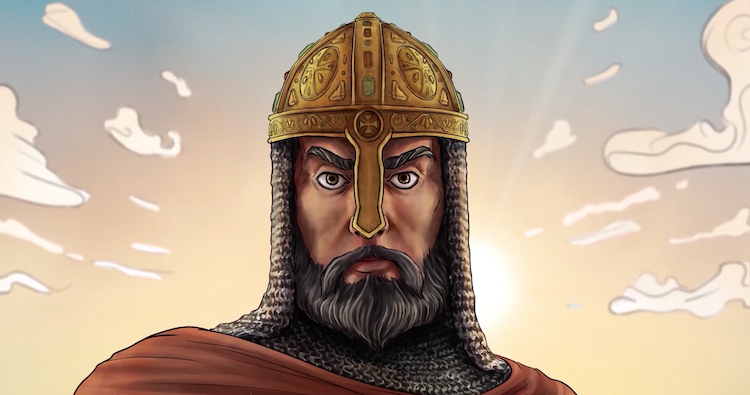Culture ministry releases trailer for upcoming videogame on key medieval battle from Georgian history

The victory in the three-hour battle led to a major change in political influence in the Caucasus - which shifted away from Muslim leaders - and the unification of the Georgian kingdom in the year following the battle. Photo: video grab.
Georgia’s culture ministry marked the commemoration day for King David IV, Georgia’s iconic 12th century ruler, on Thursday by releasing the trailer of Didgori, an upcoming videogame set in a pivotal 1121 battle led by the monarch.
The release of the trailer for the game, named after the clash between the forces of the Georgian king - also known as David the Builder, to mark his legacy in uniting and building up the kingdom - and the Great Seljuq Empire, comes ahead of its planned release later this year.
The ministry’s support for its production - the first instance of state support for such a project in Georgia - came via a competition announced by the state body in order to promote “Georgian culture, history and mythology” in the digital medium, with the winning entry coming from developer company Celestial Dimension.
Developed in the “tactical strategy” genre, the videogame is being developed to represent historical aspects in an authentic manner, with equipment and events of the medieval era created to realistically portray the era. Historian Mikheil Bakhtadze has been advising the developer team during its creation, a social media update from the ministry said.
While the trailer has been released to mark the day of King David IV, the competition had been announced to coincide with the 900th anniversary of the battle last year.
The pivotal historical event took place on August 12, 1121 in the Didgori Valley - about 40 km to the west of capital Tbilisi - where between 130,000 and 650,000 combatants clashed.
In the battle, the Seljuk army was defeated through what is described in sources as effective military tactics of King David IV, who is credited with an effective use of terrain by the defending Georgian forces, combined with a lack of manoeuvring opportunity in a constrained location for the invading forces of Najm ad-Din Ilghazi ibn Artuq.
Historical sources offer a wide variation of involved numbers, especially on the Seljuk side. The Georgian and wider Christian sources indicate anywhere between 100,000-600,000 troops from the invading army, while the Arab historical records point to 30,000 combatants in the Ilghazi army.
Georgian historian Mikheil Bakhtadze told Radio Free Europe/Radio Liberty's Georgian service he believed a force of 70,000-75,000 could have been the upper ceiling of the Seljuk capacity for mobilisation.
The Georgian forces are said to have involved around 55,000 troops including 40,000 Georgians, 15,000 Polovtsians and Kipchaks, 500 Alans, 100-500 Frank knights and other forces.
The victory in the three-hour battle led to a major change in political influence in the Caucasus - which shifted away from Muslim leaders - and the unification of the Georgian kingdom in the year following the battle.
Seen as a historic moment for the 12th century Caucasian kingdom and a shock win over a numerically superior Muslim forces (as reported in Christian historical sources), the Didgori victory is now viewed as an illustration of military acumen of Georgian rulers and a major pillar in patriotic narratives in the Georgian society.
 Tweet
Tweet  Share
Share